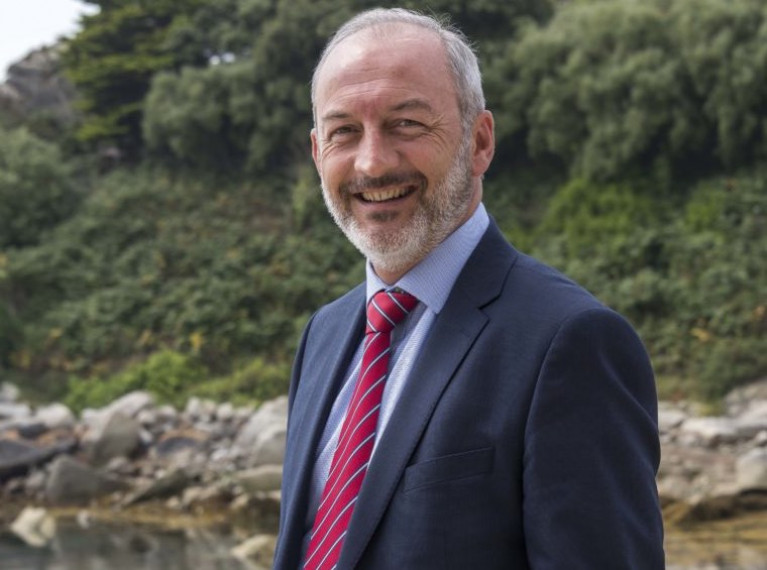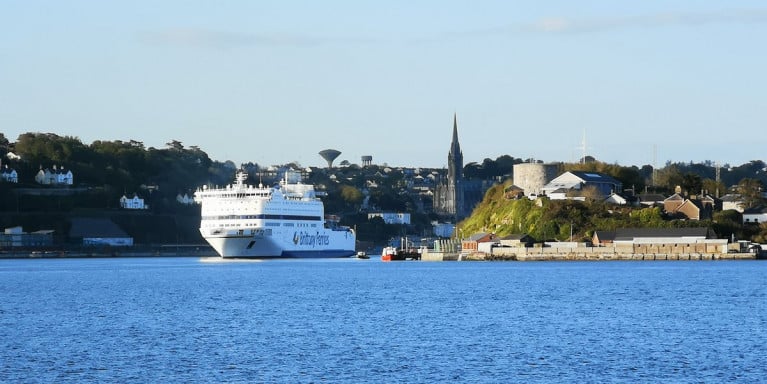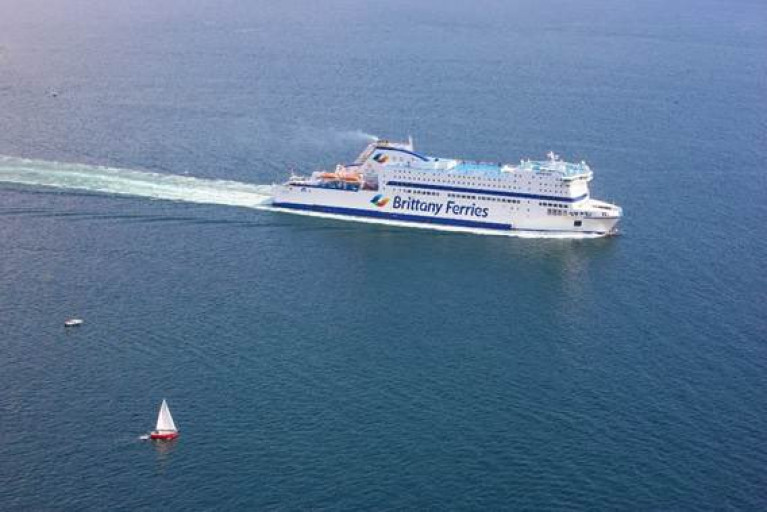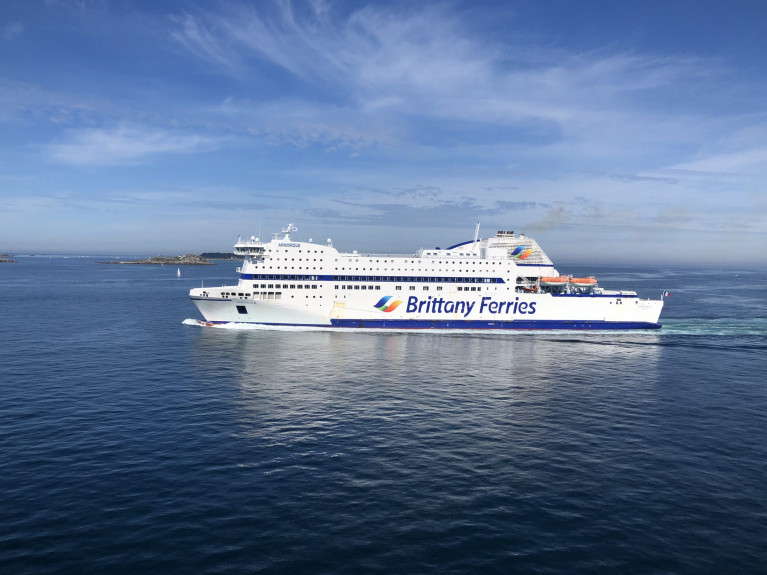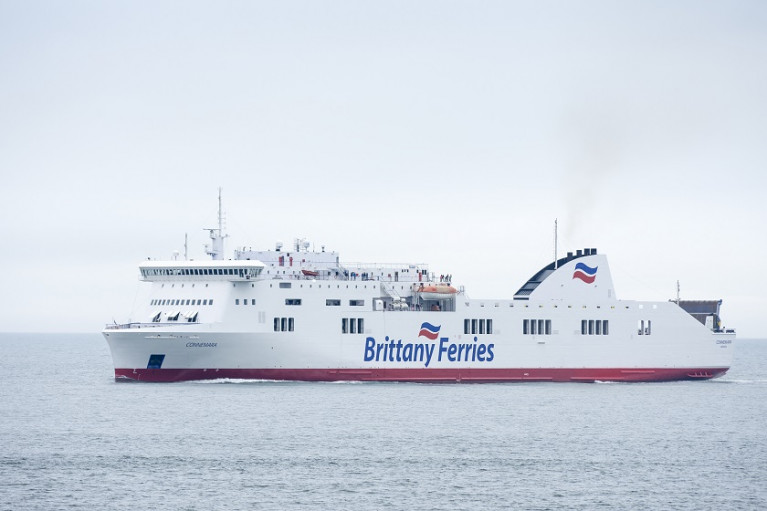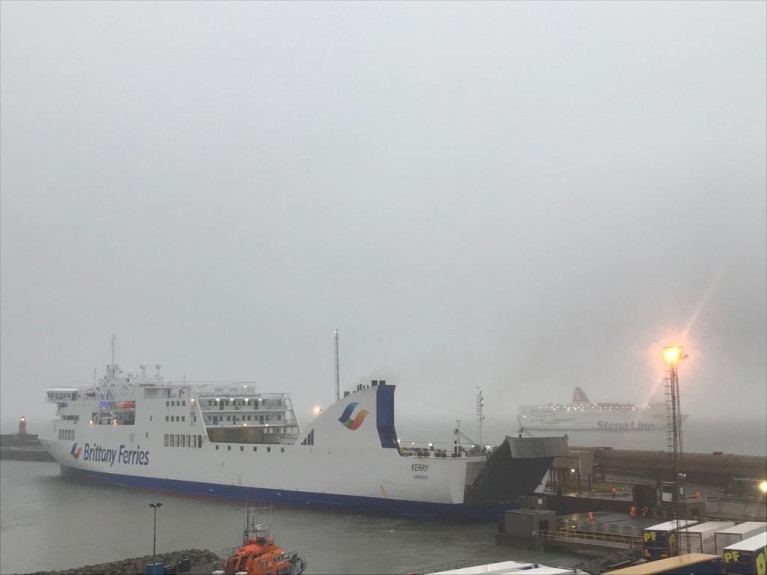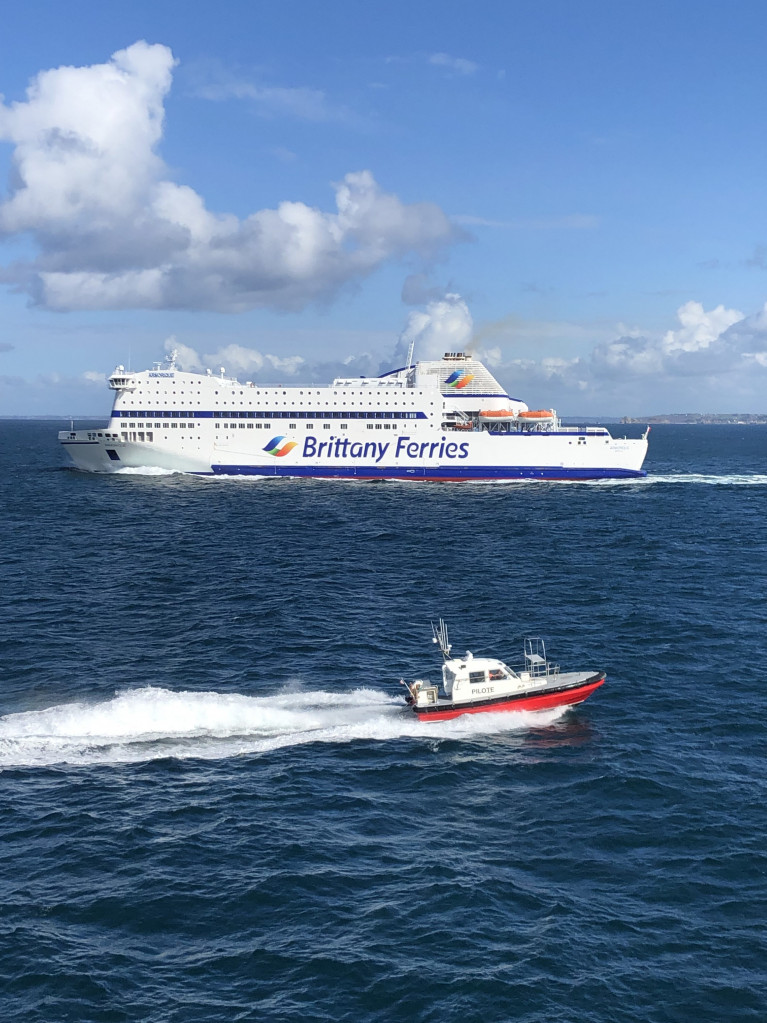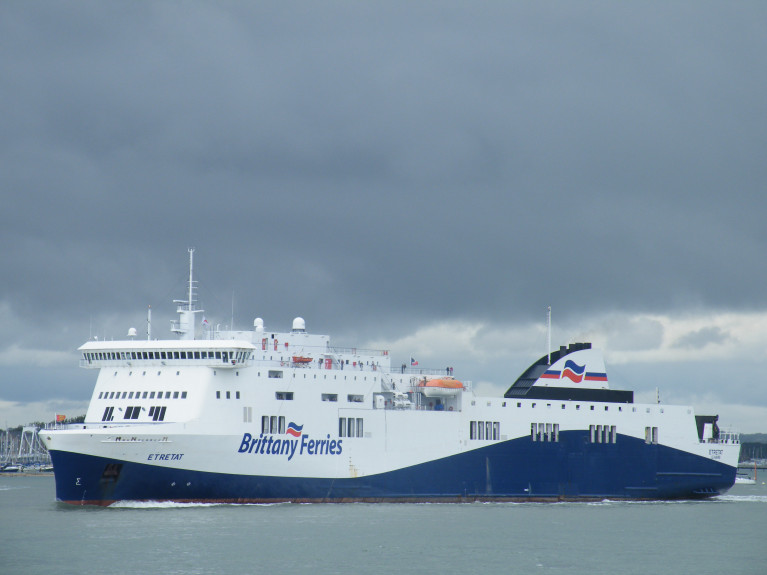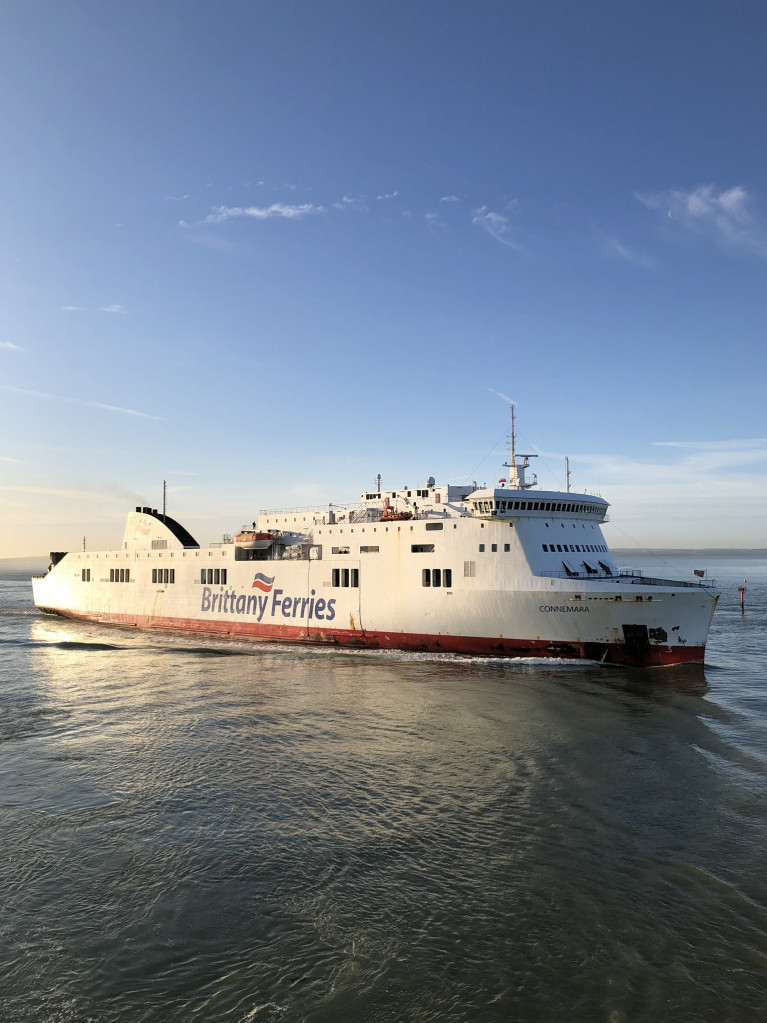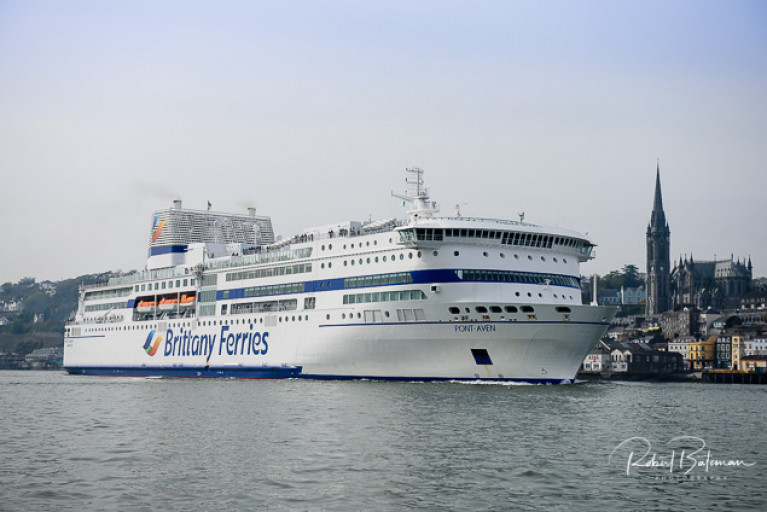Displaying items by tag: Brittany Ferries
Rising COVID Vaccine Rates Prompt Ferry Company’s Call for ‘Re-Think’ of Travel Corridors
Brittany Ferries has called for a “re-think on travel corridors” between the UK and mainland Europe as figures suggest a high take-up of COVID vaccines by the lucrative summer months.
As reported by Marine Industry News this week, the chief executive of the ferry and shipping company — which now operates four ‘Brexit bypass’ freight-only routes between Ireland and France — predicts that by late spring “there will be a clear case for the adoption of vaccination-led travel corridors that allow holidays to go ahead this summer and for hope to return”.
Christophe Mathieu adds: “Now is the time for optimism, not a shutdown on the summer getaway.”
Marine Industry News has much more on the story HERE.
Newest Brexit-Bypass As Brittany Ferries 'Freight' Route Network Includes Call to Cork
Brittany Ferries Armorique arrived into Cork Harbour this afternoon after the cruiseferry completed an inaugural new Brexit-bypass France-Ireland 'freight' only route from St.Malo, writes Jehan Ashmore
Afloat tracked Armorique's arrival some ten minutes earlier than the 15:00hrs scheduled time when berthing at the Port of Cork's Ringaskiddy Ferry Terminal.
The maritime milestone marked the second leg of Brittany Ferries four-route network of Brexit-bypass freight-only services: Rosslare-St. Malo, St. Malo-Cork, Cork-Roscoff and Roscoff-Rosslare, thus forming Armorique's rotational routes roster.
Due to the impacts of Brexit coupled with Covid-19, the cruiseferry Armorique otherwise would be operating crossings on the western English Channel route of Roscoff-Plymouth. In addition to providing annual winter cover for fleetmates undergoing dry-docking maintenance etc.
This afternoon's occasion in Cork Harbour followed the launch of the first route leg when Armorique departed Rosslare Europort on Thursday bound for St.Malo. This was another first, as the freight ro-ro route links the region of Brittany and Co. Wexford.
The St. Malo-Cork route it should be noted Brittany Ferries previously operated as a passenger service too in 1993 when the Ireland-France seasonal route including to Roscoff were both operated by Duchesse Anne. The ex. Connacht of B&I Line built in 1979 at the former Verolme Cork Dockyard, made its maiden sailing from Cork to Swansea on 7th February (42 years ago!).
The four freight routes response by Brittany Ferries to providing Irish hauliers an alternative to the UK landbridge and related customs, is easily the most comprehensive compared to rival operators using Rosslare Europort, Stena Line to Cherbourg, and newcomer DFDS to Dunkirk. This been in terms of running four routes though with operating services with just a single ship.
While Irish Ferries recently redeployed ropax Epsilon on the Dublin-Cherbourg link with a weekend round trip boosting capacity to last months introduced cruiseferry W.B. Yeats, therefore with considerably more cabins for Covid related driver accompanied traffic.
Before Covid, normal 'seasonal' sailings were to resume by W.B. Yeats but much later in May, marking the start of shoulder season and into summer holidays on the year round operated route.
In relation to seasonality, Brittany Ferries began entering the Irish marketplace with the establishment of the Cork-Roscoff route in Spring, 1978 and by the 'original' Armorique. This for the first time benefited holidaymakers on the new link between the southern city and mainland continental Europe.
According to Cork Beo, the new freight-only routes will operate until the end of March, when scheduled freight and passenger services will resume between Cork and Roscoff (two months earlier than planned). Frequency on the route will double for 2021 with two weekly sailings in each direction.
Prior to the pandemic, plans by Brittany Ferries were at an advanced stage for a new direct freight and passenger service from Cork to Santander in Spain. If the plan is reaslised it could revive trade between the south coast and France and Spain as traffic increases dramatically.
The revival, Afloat adds refers to the French operator that previously inaugurated the first ever direct Ireland-Spain route launched only in 2018. This however was shortlived as the ferry company only last year switched to a new Rosslare-Bilbao route following demands by hauliers to suit their operations. (See also new Cherbourg service below).
In addition, Cork Beo added, Brittany Ferries is understood to be still considering new ro-pax (freight and passenger) routes out of Cork for the Spring/Summer season, once travel returns to normal.
The rival of Rosslare-Roscoff, Afloat adds followed Irish Ferries closure in recent years, however the Breton company's service was shortlived as further calls from hauliers dictated the ferry scene. This led to the service dropped as Cherbourg is deemed more of a transport hub. As alluded above, Brittany Ferries opened a new Rosslare-Cherbourg service last month on the route in competition with Stena Line which also recently added a new freight only route to Dublin.
As for Armorique, a next departure looms (18:00hrs) on the third leg of Cork-Roscoff route, which by then will be the half-way stage of six in total of the combined four routes.
A lay-over period however awaits Armorique back in its Breton homeport tomorrow before the ferry returns to Cork on Tuesday, then its back again to Roscoff arriving Wednesday. The next sailing from Brittany is to Rosslare Europort with an arrival on Thursday to complete the circuit.
The new freight routes follow ferry freight only operator, CLdN's decision in recent months to add a second weekly con-ro (container/vehicle) service on the Cork-Zeebrugge route that was launched last May.
Afloat will have more on a previous operator(s)? among them Cork-St. Malo Ferries using a former DFDS freighter with limited passenger capacity.
Further Expansion By Brittany Ferries, Increases Rosslare's European Services to 32 Weekly
The Government's Operational Update review on trade a month after the post-Brexit transition ended, Afloat adds narrowly missed inclusion as yet another ferry development arose today, as Brittany Ferries announced new 'freight' routes increasing capacity directly to mainland Europe.
Glenn Carr, General Manager of Rosslare Europort welcomed the announcement by Brittany Ferries of a further weekly service each between the Co. Wexford port and St Malo and Roscoff, in Brittany, France.
As also reported today, the revived Roscoff route resumes service this Thursday, 4th February (this follows, Afloat adds the route's debut last year albeit also available for passengers).
The new services combined bring to 32 – sixteen in each direction – the number of weekly direct services across all shipping operators between Rosslare Europort and the European continent, establishing Rosslare as Ireland’s number one port for direct European services.
The first month of trading in 2021 has seen sensational results at Rosslare Europort. Despite the challenges of Covid 19 and the current difficulties with the UK post Brexit, overall Freight traffic at the port is 45% ahead when compared to the same period last year.
While UK traffic is down 49% for January, European Freight is up an incredible 446% year on year with unprecedented demand for the new direct services operating from Rosslare Europort to mainland Europe.
Commenting on the first month of trading for 2021, General Manager, Glenn Carr stated “We are absolutely delighted with how the market has reacted and supported our direct services from Rosslare to Europe, and welcome Brittany Ferries further commitment to the needs of Irish industry with this new service announced today.
The demand has been phenomenal for the new and expanded services from all of our operators, and these results prove the strategic importance and potential of the port to our customers, industry and our economy. Through the significant challenges with Covid and Brexit, great credit must go to all colleagues working at the port and our shipping lines who have provided exceptional frequency and capacity on the now 32 services a week between Rosslare and Europe. We will continue to work with shipping lines and Irish industry in identifying further opportunities to meet market demand, and ensure that we build on the work to-date at the port to maximise the role of Rosslare Europort for both the South-East and wider economy of Ireland.
These are very exciting times at Rosslare Europort with the increase in business, commencement of our €35 million Masterplan and our recent proposal to Government for the port to be further developed as the Off-Shore Wind Energy Hub for the country and I look forward to working with all stakeholders in achieving this.”
The new Brittany Ferries service is the latest boost in 2021 to direct services between Rosslare Europort and the Continent.
So far, we have seen:
- New six-times weekly DFDS Rosslare Europort to Dunkirk service commence
- Expansion of Stena Line Rosslare Europort to Cherbourg services from three services each way weekly to six services each way weekly
- Stena Line capacity further increased, with the new Stena Embla redeployed to the Rosslare to Cherbourg route since Thursday 14th January
- Brittany Ferries began its weekly each way service between Rosslare Europort and Cherbourg two months ahead of schedule, in addition to the operators ongoing twice weekly each way service between Rosslare and Bilbao.
- In addition as Afloat earlier reported, Brittany Ferries is to start a new weekly Rosslare to St Malo route
By-Pass Brexit Sees Brittany Ferries Plan for 'Another' Ireland-France Freight Route
With fallout of post-Brexit, demand from hauliers for direct ro-ro freight routes has led to 20 interventions by shipping companies notably between Ireland-France and another new route may be added to the fast-changing ferry scene, writes Jehan Ashmore.
According to Brittany Ferries, plans are in progress for a further freight route, this would involve connecting two Breton ports, Roscoff and St. Malo with Ireland. The aim of the French operator is to finalise schedules and begin operations as early as next month using Ro-Pax vessel Armorique (above) which Afloat adds operated the Cork-Roscoff 'seasonal' service while standing in for routine cruiseferry Pont-Aven in 2019 due to repairs required.
A growing number of haulage companies are shipping goods using unaccompanied trailers. Brittany Ferries says demand is rising, and the ports it serves on the western English Channel in France, the UK and Ireland are set-up to receive these loads. It believes more companies will look west in the months to come, and it has urged hauliers and logistics companies to get in touch.
“Things like negative Covid tests for drivers are certainly helping drive the trend for unaccompanied loads,” commented Simon Wagstaff Brittany Ferries freight director. “However, there are other financial benefits in going driverless. We know of one large haulage operation in Ireland, for example, that has organised reciprocal arrangements with another in Spain, dropping off and picking up trailers for each other. That’s a cost-effective way of doing business.”
In 2018 Brittany Ferries launched the first ever direct Ireland-Spain route, Cork-Santander, however Afloat adds the link was abandoned in favour of switching both Irish and Spanish ports. This led to another new Ireland-Iberian link, the Rosslare Europort-Bilbao route (launched almost a year ago) that predominantly serves freight traffic.
Just 10 days ago, Brittany brought forward the opening of another service out of Rosslare to Cherbourg, initially operated by Cap Finistere (see Afloat photo caption yesterday) however in mid-February to be replaced by ro-pax Connamara which launched the Cork-Santander route and followed by the Kerry.
The earlier than scheduled launch of the new Wexford-Normandy connection is to enable Irish, French and Spanish hauliers seek an alternative to the UK land-bridge, with the cost, time and administrative burden that this now brings.
In a normal non-Covid year, the French operator handles around 210,000 freight units using a twelve-strong ferry fleet which also operates on the English Channel and Bay of Biscay. The ferries serve Caen, Cherbourg, Le Havre, St. Malo and Roscoff in France, Portsmouth, Poole and Plymouth in the UK, Santander and Bilbao in Spain.
The Irish ports used by Brittany Ferries, saw Cork first served in 1978 to open the Roscoff route and last year's debut out of Rosslare 'Europort', where the south-east port (in 1990 was 'branded' given its suffix) is currently very much centre-stage.
Operator Brittany Ferries Asked by Governments if it Can Repatriate Irish Lorry Drivers
Governments from Ireland and France have made contact with Brittany Ferries about running a ferry from France to repatriate Irish lorry drivers stranded in Europe by France’s Covid travel ban on Britain should the need arise.
As The Irish Times reports, the French shipping line is understood to have been asked by the French transport minister, Jean-Baptiste Djebbari, to examine whether it could provide capacity for a sailing to Ireland should it be required to accommodate Irish hauliers affected by the ban on travel to and from Britain.
There have been discussions between Irish and French government officials and with ferry companies to see if additional ships could be redirected in the wake of the ban introduced on Sunday night to prevent the spread of a new infectious coronavirus strain from Britain.
Discussions are taking place about whether Brittany Ferries should run a ship from the port of Caen to Rosslare. The company already runs a service between Rosslare and Bilbao in Spain and is due to (open) a new service between Rosslare and Cherbourg from March.
Government officials are assessing whether the additional capacity provided by Stena Line running a second ferry on the Rosslare-Cherbourg route (today) will meet the required demand.
There will be two Stena ferries leaving for Cherbourg following the announcement.
Third Brittany Ferries Ship to Lay-Up as Operator Faces 'Worst Crisis' Ever
Brittany Ferries which has been affected by quarantine measures, has laid up another ferry and cut more services as it continues to lose passengers due to coronavirus restrictions and faces the worst crisis in its 47-year existence.
As BusinessLive reported the French ferry firm said it continues to struggle due to a “terrible” summer season” and weak demand for services this autumn, and has therefore been forced to take “further decisive action”.
The company, which has already laid up two vessels (last month) and scrapped some services following the imposition of quarantine restrictions for passenger landing from France and Spain, had now made further schedule changes, which will be implemented within the next week. The aim is to reduce costs as part of the company’s five-year recovery plan, the firm said.
It will see the (former Irish serving ropax) Connemara, currently serving Portsmouth to Cherbourg and Le Havre, taken out of service entirely from September 7. This means the closure of these routes until further notice.
Afloat adds as regards to Ireland-France route and operations the following applies:
Pont-Aven, flagship cruiseferry on the Roscoff – Cork will continue to operate a once weekly sailing, though ropax Kerry on the Roscoff – Rosslare service will cease service from 7 September (originally to end the season next month). The new Wexford-Brittany route was to be launched in March but the emerging Covid-19 crisis led to the service beginning in the summer.
Kerry which also maintains the year-round Ireland-Spain service of Rosslare – Bilbao remains unaffected with sailing schedules continuing as normal. Likewise of the French route, the Ireland-Iberian route was launched this year but earlier, having begun in late February.
Major Changes As Brittany Ferries to Lay-Up Ships, Cuts Services As Demand Slumps After UK Quarantine
Major changes at Brittany Ferries have forced the operator to introduce a reduction in services following the imposition of (Covid-19) quarantine on travellers returning to the UK from France and the effect this has had on existing reservations as well as forward demand.
This has led Brittany Ferries from today confirming changes to scheduled services (as outlined further below).
The news follows a weekend in which 35,000 passengers (English Channel routes) either cancelled or delayed their travel plans with the company. Forward demand for autumn sailings is also extremely weak.
As a consequence, the company has been forced to change its schedules, with the first changes applying from the end of August. The following ships and route amendments have now been confirmed:
- Brittany Ferries Armorique will be laid up from 31 August. This cruiseferry currently serves the Plymouth-Roscoff route (which Afloat adds notably launched the ferry company in 1973 and five years later the Cork-Roscoff route was introduced)
- Brittany Ferries Pont-Aven will replace Armorique on the Plymouth to Roscoff route from 10 September with three return trips per week. Pont-Aven will also continue to operate one return sailing from Plymouth to Santander and from Roscoff to Cork during the week. (Afloat adds the Irish 'weekend' seasonal service is unaffected) noting for the 2021 season there will be more capacity along with a new Rosslare-Cherbourg route).
- Brittany Ferries Bretagne will be laid up from 7 September. She currently serves the Portsmouth to St Malo route.
- Brittany Ferries Etretat will not resume crossings, as planned: Connemara will continue to operate the Cherbourg and Le Havre rotations from Portsmouth, but will no longer serve Spain.
“We warned over the weekend that schedule changes were likely, as quarantine measures have led to a significant drop in demand for our services,” said Christophe Mathieu, director general Brittany Ferries. “This is not something we want to do. However, in the context of a terrible summer season we have no choice but to consolidate sailings that, by virtue of lack of passenger numbers, are uneconomic to run. These extraordinary decisions are regrettable and we apologise in advance to all those whose travel plans will be disrupted.”
Around 50,000 passengers with existing bookings will be affected by the schedule changes. Brittany Ferries apologises in advance for the inconvenience and will do all it can to accommodate displaced customers on other services.
The call centre is expected to be very busy in the days ahead. Passengers are therefore asked to wait for notification of any change to their booking and – where possible – to make alternative arrangements via the My Booking facility on the operators UK website here.
Afloat adds for any further information /Covid-19 updates on Ireland-France routes visit the Brittany Ferries Irish website here.
Brittany Ferries Plans to Use Another 'French Connection' Port is Followed by Second Cork Cruiseferry Move
Operator Brittany Ferries this week announced plans to increase services out of two Irish ports in 2021 but the new developments may lead to further consequences for the ferry firm given fluidity of Brexit, Covid-19 and economies impacting ferry holiday-makers and freight, writes Jehan Ashmore.
As a second Cork-Roscoff cruiseferry move which Afloat highlighted last weekend was followed by further plans for a new Ireland-France route published on mainstream media, demonstrated the company’s long-term commitment to Ireland. According to Brittany Ferries this in despite of on-going uncertainty over (Covid-19) travel restrictions and quarantine requirements this season, and the effect this is having on service viability.
- New Rosslare – Cherbourg route to open (in 2021) Afloat confirms to begin on 22nd March (using the Irish Rail operated 'Europort')
- connecting Cherbourg which is in response to demand from Irish and continental hauliers
- Additional mid-week sailing added to Cork – Roscoff 'seasonal' service (also 2021) Afloat also confirmed to be 24th March
In 2021, as alluded above a totally new route Rosslare-Cherbourg connection is to be added to the Rosslare-Bilbao sailings (from the Wexford port) which commenced earlier this year. In addition according to Brittany Ferries there is further good news for the Port of Cork with the addition of an extra mid-week sailing from Cork – Roscoff. The development Afloat adds follows the closure earlier this year of the first Ireland-Spain direct route of Cork-Santander only launched in 2018.
The new sailings Brittany Ferries adds will see the utilisation of Connemara* (a ropax for Rosslare) and the Armorique (cruiseferry for Cork). The Amorique will join the flagship Pont-Aven which (like today) continues to serve the main Cork – Roscoff sailings at weekends.
Afloat however consulted the website sailing schedule to discover no-frillls (économie) branded ferry, Etretat* is rostered instead of Connemara deployed on the Rosslare-Cherbourg route. So Afloat awaits a reply from Brittany Ferries for the change of ropax which had served Rosslare before and for the former Celtic Link Ferries. In addition the Etretat is rostered to take over Kerry from November on the Rosslare-Bilbao crossing that covers both the Celtic Sea and Bay of Biscay.
The announcement of developments on Thursday comes on the day the company launched its schedules for 2021 sailings connecting the UK & Ireland with Spain. Reservations for all 2021 routes are now open. Passenger reservations can now be made for services up to the end of (October next year) on the following routes:
Rosslare – Bilbao
Cork – Roscoff
Rosslare – Cherbourg
The new Rosslare-Cherbourg connection promises more choice and greater capacity on ferries linking Ireland and France.
Earlier this year, Brittany Ferries opened a new Ireland-Spain service, Rosslare-Bilbao and (more recently the 'seasonal' Rosslare-Roscoff) operated by another no-frillls / économie branded ferry, Kerry. This ropax took over from Connemara on the original operators Cork-Santander service which was withdrawn earlier this year.
Primarily for freight, the twice-weekly Spanish rotations proved popular. However Irish and French hauliers have asked Brittany Ferries to move the weekly French rotation from Roscoff to the transport hub of Cherbourg.
Afloat requested a response from the ferry operator as to why no sailings are advertised for bookings on the Rosslare-Roscoff route in 2021, however no reply was forthcoming. In the meantime this 'holiday' route is the second shortest sea duration route connecting Ireland and mainland Europe and is so far available to book at least until late October.
Brittany Ferries has agreed to the hauliers request and confirmed that Connemara (despite ferry website's schedule of Etretat) to operate as a 'no-frills' branded service and which will serve two weekly Rosslare-Bilbao rotations, as well as a single Rosslare-Cherbourg rotation as of March next near.
It would appear that freight is 'king' in this regard to the priority of French port use and likewise the decision by Brittany Ferries to abandon the Cork-Santander link in favour of haulier demands then to relocate both Ireland-Spain ports to the current Rosslare-Bilbao route.
There is however good news for the Cork-Roscoff route too cited Brittany Ferries. As primarily the service serves the tourist market with a near 50-50 split of Irish and French holiday-makers. These travellers will now benefit from an additional weekly rotation between the two ports, thanks to the introduction of the operator's aformentioned Armorique.
Roscoff-Cork weekend sailings will remain served by flagship Pont-Aven and with this new rotation by the Armorique during the week, significantly increasing capacity out of and into Cork. It will open more choice for those seeking a shorter break in either Ireland or France, with options to leave and return with Brittany Ferries, either mid-week or at the weekend.
Armorique will also continue in 2021 to maintain Roscoff-Plymouth service from where the cruiseferry custom-built for the western-most English Channel route made a maiden debut in 2008. Since then the cruiseferry has covered in for fleetmates on other routes among them Cork-Roscoff last year and previously reported on Afloat on the Caen (Oustreham)-Portsmouth route.
Port of Cork Set for Increased Ferry Frequency to France (Plus in 2021 New Route from Rosslare)
Ferry operator Brittany Ferries, writes EchoLive, has announced plans to increase services out of both Cork and Rosslare in 2021, despite ongoing uncertainty amid Covid-19.
The Port of Cork will see as Afloat on Saturday reported a new midweek sailing from Cork to Roscoff in addition to the weekend service already in place.
The Armorique vessel will be used for the sailings, which is new to Ireland (albeit see relief duties last year)
The Pont-Aven, one of the company’s (which is the flagship) ferries, will continue to serve the main Cork to Roscoff (seasonal) sailings at the weekend.
This route serves primarily tourists, with an approximate 50-50 split between French and Irish holidaymakers.
The company said: “It will open more choice for those seeking a shorter break in either Ireland or France, with options to leave and return with Brittany Ferries, either mid-week or at the weekend.”
For more plus announcement of a new Rosslare-Cherbourg route also in 2021, click here.
AFLOAT adds Brittany Ferries is to reintroduce ropax Connemara (following this year's closure of Cork-Santander service) back to Irish waters but running out of Rosslare. Afloat however also consulted the operator's website and noted that another 'Visentini' built ropax Etretat (ex. Norman Voyager of former Celtic Link Ferries) is scheduled to operate the 'économie' branded route from November. (It should be noted the schedule was updated today).
Connemara originally launched the Cork-Spain route in 2018 before replaced by yet another Visentini built ropax the Kerry.
Currently, Kerry operates the relocated Ireland-Spain service of Rosslare-Bilbao. In addition to serving Brittany Ferries other second new route out of the Wexford ferryport, the seasonal service to Roscoff which was due to open in March but was delayed due to the initial impact of Covid-19 and related travel restrictions.
Afloat also consulted the Rosslare-Roscoff sailings scheduled for this season up to October (but not listed for 2021). So could it appear the overcapacity by Brittany Ferries themselves be at the expense? of yesterday's official announcement of their newest route of Rosslare-Cherbourg (also seasonal).
As passenger reservations currently available for services up to the end of October (2021) aply to the following routes: Rosslare – Bilbao, Cork – Roscoff and the aformentioned Rosslare – Cherbourg route but excludes any reference to the Wexford-Brittany link.
Operator Brittany Ferries Confirms Date of Passenger Services to Resume Cork-Roscoff Route
Operator Brittany Ferries have confirmed that passengers will be able to travel to France from Cork via the high seas from (next) Monday, 29 June.
The ferry service, writes CorkBeo.ie, will be running a limited service of five ships over the next few weeks before three more ships are launched in July.
For the safety of passengers, freight drivers and crew, passenger capacity will be limited onboard by more than 60%.
From next week Irish passengers will be able to travel from Cork and Rosslare to Roscoff, France, and Rosslare to Bilbao, Spain.
Ferry travel is thought to be one of the safest modes of international transit as passengers can opt to stay in their cars for the duration of the journey, in their personal cabin, social distance in the wide public spaces or stay on the open deck areas.
In a statement, Brittany Ferries said: “Capacity limits will be ship dependent, and will be reviewed as the summer progresses.
For further reading includng the operator's 12-point guide to safe travel this summer click here.


























